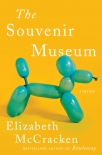The Souvenir Museum, Elizabeth McCracken [bill gates best books .txt] 📗

- Author: Elizabeth McCracken
Book online «The Souvenir Museum, Elizabeth McCracken [bill gates best books .txt] 📗». Author Elizabeth McCracken
I had my own hangover now, not terrible, a wobbling threat that might yet be kept at bay. I had taken three baths; my toenails were vampy red. I had watched television till the end of broadcast hours, which was a thing that happened then: footage of the American flag waving in the breeze, then here be monsters. In my other life, the one that happened outside of the Narcissus Hotel, I worked in the HR department of a radio station. I lived with voices overhead. That was why I didn’t have a television. It would have been disloyal. I’d found a rerun on a VHF station of squabbling siblings and had proceeded to weep for hours, in the tub, on one double bed, then the other. Even at the time I knew I wasn’t weeping over anything actual that I’d lost, but because I’d wanted love and did not deserve it. My soul was deformed. It couldn’t bear weight.
The rich man sat at the back of the breakfast room in one of the large horseshoe booths built for public canoodling. His pale green shirt, starched, flawless, seemed to have been not ironed but forged, his mustache tended by money and a specialist. His glasses might have cost a lot, but twenty years before. In his fifties, I thought. In those days fifties was the age I assigned people undeniably older than me. I never looked at anyone and guessed they were in their forties. You were a teenager, or my age, or middle-aged, or old.
The waiter went to the man’s table and murmured. The man answered. At faces I am no good but I always recognize a voice.
“Dr. Benjamin,” I said, once the waiter had left. He looked disappointed, with an expression that said, Here, of all places. He inclined his head to recognize my recognition. “I listen to you,” I told him.
He hosted an overnight advice show, eleven p.m. to two a.m., on another AM channel, not mine. He had a beef bourguignon voice and regular callers. Stewart from Omaha. Allison from Asbury Park, New Jersey. Linda from Chattanooga.
“Thank you,” he said. Then added, “If that’s the appropriate response.”
“I’m in radio, too,” I said. “Not talent. HR.”
The waiter stood by my table, a tall young man with an old-fashioned Cesar Romero mustache. When I looked at him he smiled and revealed a full set of metal braces.
“I will have the fruit plate,” I said. Then, as though it meant nothing to me, an afterthought, “and a Bloody Mary.”
It is the fear of judgment that keeps me behaving, most of the time, like the religious. Not of God but of strangers.
“Hair of the dog,” the radio shrink said to me.
“Hair of the werewolf,” I answered.
“You could be. On air. You have a lovely voice.”
In my head I kept a little box of compliments I’d heard more than once: I had nice hair (wavy, strawberry blond), and nice skin, and a lovely voice. I didn’t believe the compliments, particularly at such times in my life, but I liked to keep them for review, as my mother reviewed the scrapbooks from her childhood in a small town, when her every unusual move—going to England on a trip, performing in a play in the next town over—made the local paper.
Who in this story do I love? Nobody. Myself, a little. Oh, the waiter, with his diacritical mustache above his armored teeth. I love the waiter. I always love the waiter.
The Bloody Mary had some spice in it that sent a tickle through my palate into my nose. A prickle, a yearning, an itch: a gathering sneezish sensation. One in ten Bloody Marys did this to me. I always forgot. I took another drink and the feeling intensified. Beneath the pressure of the spice was a layer of leftover intoxication that the vodka perked up. I thought, not for the first time, that I had a sixth sense and it was called drunkenness.
“No good?” the radio shrink asked me.
“What?”
“You’re making a terrible face.”
“It’s good,” I said, but the sensation was more complicated than that. “What are you doing in this neck of the woods?”
“Is it a neck?” He touched his own neck with the tips of his fingers. “I like the rooms here.”
“You probably have a nicer room than I do. The presidential suite. The honeymoon.”
“I’m neither the president nor a honeymooner.”
“Those’re the only suites I know,” I said. It was possible to be somebody else in a hotel; I was slipping into a stranger’s way of speaking. I said, “Far from Chicago.”
“Far from Chicago,” he agreed. He picked up his coffee cup in both hands, as though it were a precious thing, though it was thick china, the kind you’d have to hurl at a wall to break. “Business,” he said at last. “You?”
“I live here.”
“You live in the hotel?”
“In town.”
“Oh, you’re merely breakfasting, not staying.”
“I’m staying.” I started to long for a second Bloody Mary as though for an old friend who might rescue me from the conversation. “Somebody was mean to me,” I said to the radio shrink. “I decided to be kind to myself.”
He palmed the cup and drank from it then settled it back in the saucer. The green shirt was a sickening color against the pink leather. “It’s a good hotel for heartbreak. Join me,” he said, in his commercial break voice, deeply intimate, meant for thousands, maybe millions, of people.
There were other radio hosts in those days, also called doctors, who would yell at you. A woman who said to heartbroken husbands, You better straighten up and





Comments (0)